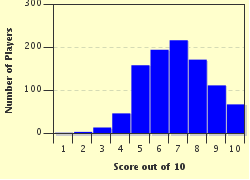Quiz Answer Key and Fun Facts
1. If you were in the Sahara in July in the middle of a sandstorm, you might say, "Hace mucho calor y está venteando mucho" to express that it is very hot and windy. If you said that, what language would you be speaking?
2. If you were to travel to Angola or Mozambique, and you found the same weather conditions, what would you say to express that it is very hot and windy today?
3. Of course if we were to try to find a beautiful day, and went to the Riviera, we might want to say that it would be sunny (tomorrow). How would we say that in French?
4. When you are in a cold and windy place, your lips will often turn blue. Which of the following words does NOT mean "blue" in the language given?
5. Sometimes when it rains it pours, and when it pours, it rains cats and dogs. Many languages have interesting expressions used in the same context. Which of the following expressions would NOT be synonymous to the English one?
6. There are many places in the world where the fog can rise up and become almost impenetrable in a very short time. Where in the world would I be and what language would I be speaking if I said, "un brouillard à couper au couteau"?
7. Since we are the Four Winds, can you identify the word for "wind" in Spanish?
8. When the winds are extremely strong, it can result in a storm called "hurricane" in the Western hemisphere and "typhoon" in the Eastern hemisphere. Which of the following does NOT specifically mean a hurricane or typhoon?
9. The Italian word for "drought" is "siccità". True or False?
10. One consequence of severe thunderstorms and rains is flooding. Where would I be and what language would I be speaking if I said, "vloed" for flood.
Source: Author
shuehorn
This quiz was reviewed by FunTrivia editor
stedman before going online.
Any errors found in FunTrivia content are routinely corrected through our feedback system.

